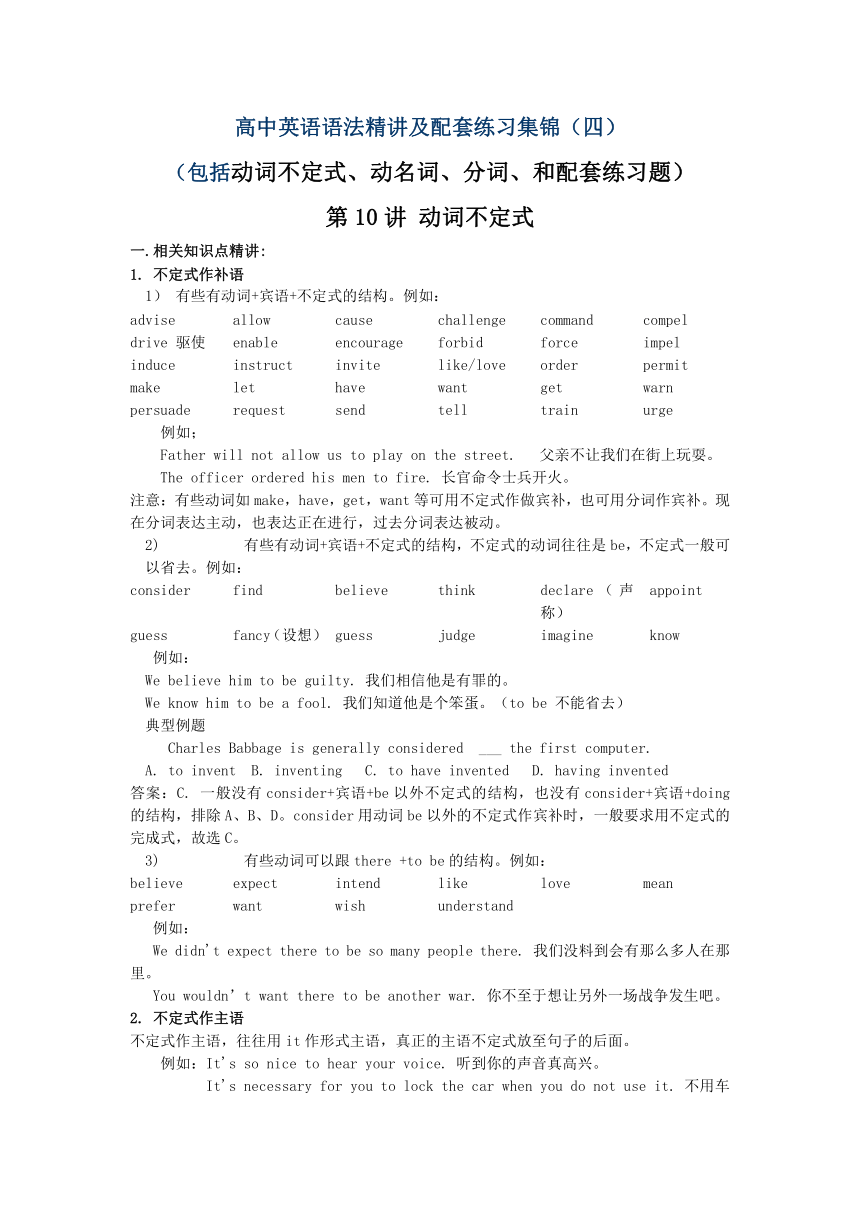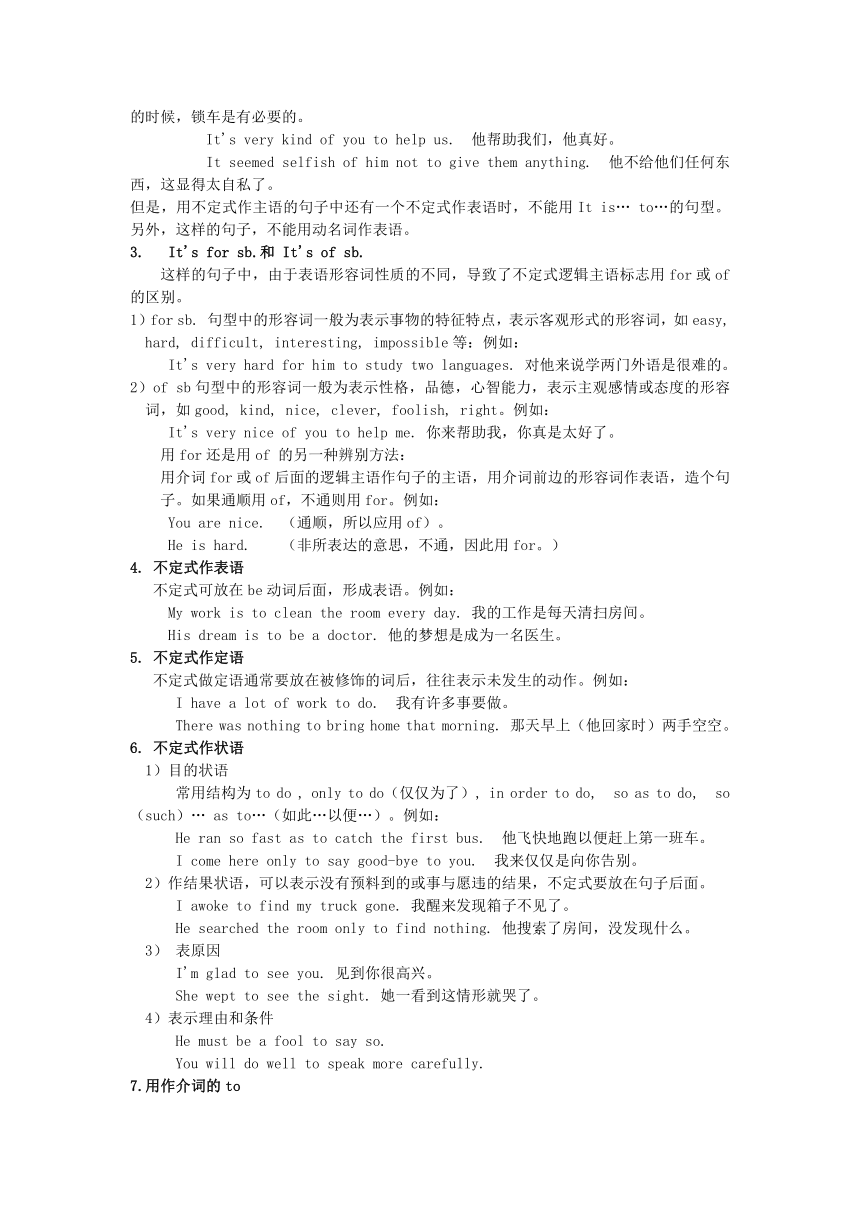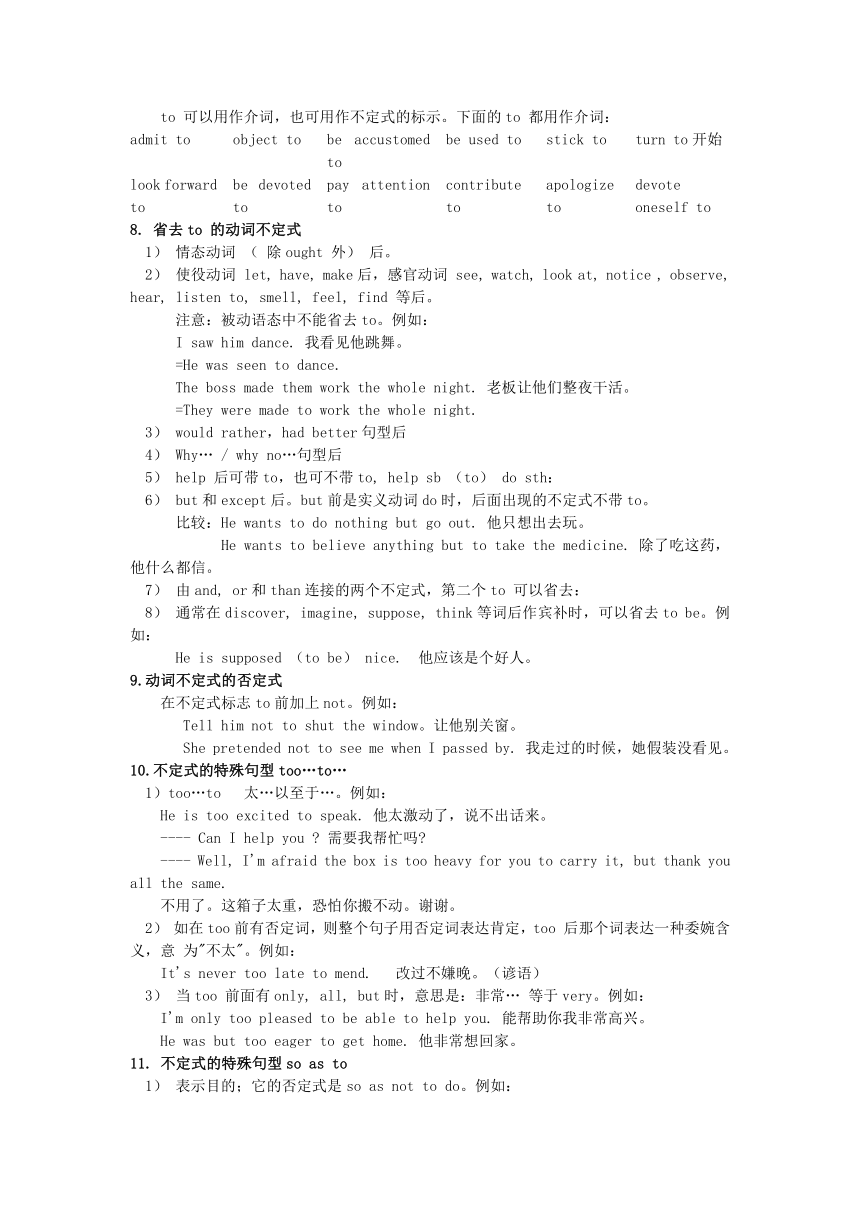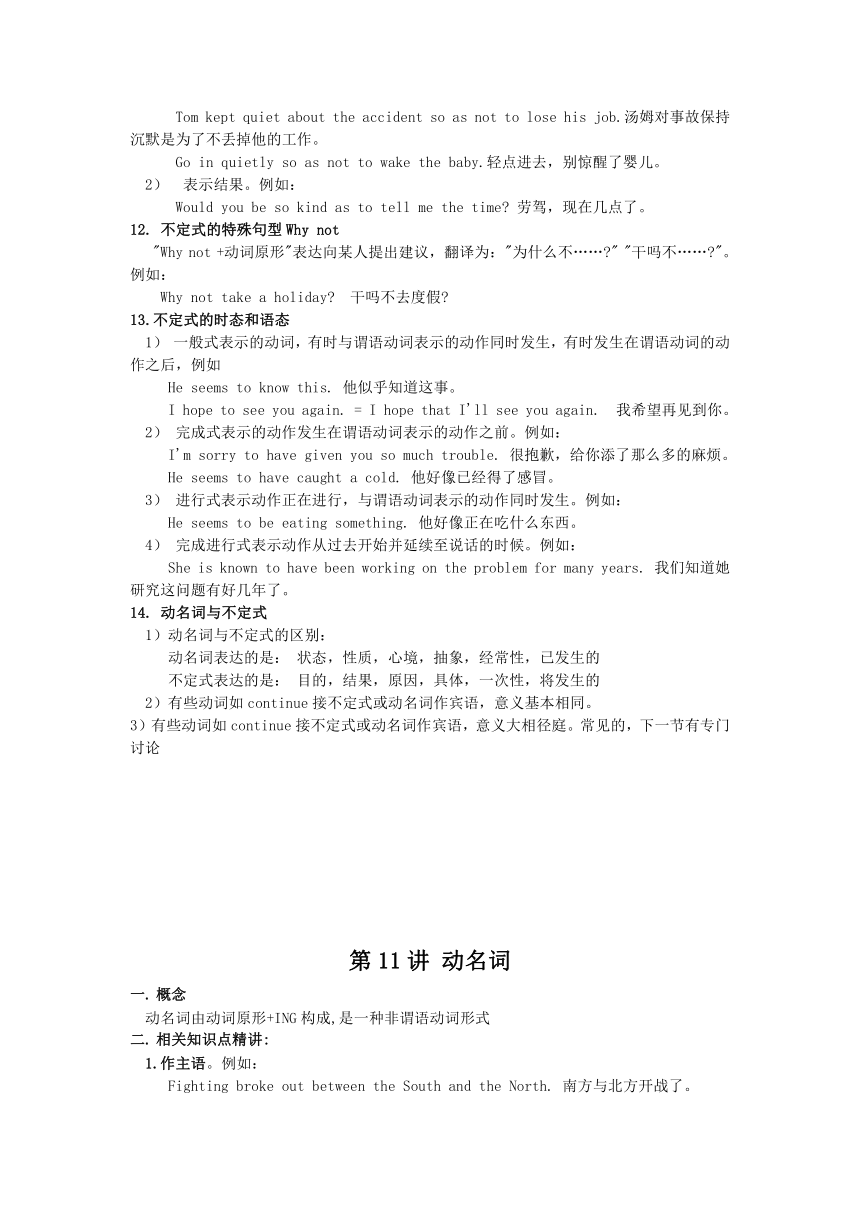高中英语语法精讲及配套练习集锦(四)
图片预览




文档简介
高中英语语法精讲及配套练习集锦(四)
(包括动词不定式、动名词、分词、和配套练习题)
第10讲 动词不定式
一.相关知识点精讲:
1. 不定式作补语
有些有动词+宾语+不定式的结构。例如:
advise allow cause challenge command compel
drive 驱使 enable encourage forbid force impel
induce instruct invite like/love order permit
make let have want get warn
persuade request send tell train urge
例如;
Father will not allow us to play on the street. 父亲不让我们在街上玩耍。
The officer ordered his men to fire. 长官命令士兵开火。
注意:有些动词如make,have,get,want等可用不定式作做宾补,也可用分词作宾补。现在分词表达主动,也表达正在进行,过去分词表达被动。
2) 有些有动词+宾语+不定式的结构,不定式的动词往往是be,不定式一般可以省去。例如:
consider find believe think declare(声称) appoint
guess fancy(设想) guess judge imagine know
例如:
We believe him to be guilty. 我们相信他是有罪的。
We know him to be a fool. 我们知道他是个笨蛋。(to be 不能省去)
典型例题
Charles Babbage is generally considered ___ the first computer.
A. to invent B. inventing C. to have invented D. having invented
答案:C. 一般没有consider+宾语+be以外不定式的结构,也没有consider+宾语+doing的结构,排除A、B、D。consider用动词be以外的不定式作宾补时,一般要求用不定式的完成式,故选C。
3) 有些动词可以跟there +to be的结构。例如:
believe expect intend like love mean
prefer want wish understand
例如:
We didn't expect there to be so many people there. 我们没料到会有那么多人在那里。
You wouldn’t want there to be another war. 你不至于想让另外一场战争发生吧。
2. 不定式作主语
不定式作主语,往往用it作形式主语,真正的主语不定式放至句子的后面。
例如:It's so nice to hear your voice. 听到你的声音真高兴。
It's necessary for you to lock the car when you do not use it. 不用车的时候,锁车是有必要的。
It's very kind of you to help us. 他帮助我们,他真好。
It seemed selfish of him not to give them anything. 他不给他们任何东西,这显得太自私了。
但是,用不定式作主语的句子中还有一个不定式作表语时,不能用It is… to…的句型。另外,这样的句子,不能用动名词作表语。
3. It's for sb.和 It's of sb.
这样的句子中,由于表语形容词性质的不同,导致了不定式逻辑主语标志用for或of的区别。
1)for sb. 句型中的形容词一般为表示事物的特征特点,表示客观形式的形容词,如easy, hard, difficult, interesting, impossible等:例如:
It's very hard for him to study two languages. 对他来说学两门外语是很难的。
2)of sb句型中的形容词一般为表示性格,品德,心智能力,表示主观感情或态度的形容词,如good, kind, nice, clever, foolish, right。例如:
It's very nice of you to help me. 你来帮助我,你真是太好了。
用for还是用of 的另一种辨别方法:
用介词for或of后面的逻辑主语作句子的主语,用介词前边的形容词作表语,造个句子。如果通顺用of,不通则用for。例如:
You are nice. (通顺,所以应用of)。
He is hard. (非所表达的意思,不通,因此用for。)
4. 不定式作表语
不定式可放在be动词后面,形成表语。例如:
My work is to clean the room every day. 我的工作是每天清扫房间。
His dream is to be a doctor. 他的梦想是成为一名医生。
5. 不定式作定语
不定式做定语通常要放在被修饰的词后,往往表示未发生的动作。例如:
I have a lot of work to do. 我有许多事要做。
There was nothing to bring home that morning. 那天早上(他回家时)两手空空。
6. 不定式作状语
1)目的状语
常用结构为to do , only to do(仅仅为了), in order to do, so as to do, so(such)… as to…(如此…以便…)。例如:
He ran so fast as to catch the first bus. 他飞快地跑以便赶上第一班车。
I come here only to say good-bye to you. 我来仅仅是向你告别。
2)作结果状语,可以表示没有预料到的或事与愿违的结果,不定式要放在句子后面。
I awoke to find my truck gone. 我醒来发现箱子不见了。
He searched the room only to find nothing. 他搜索了房间,没发现什么。
3) 表原因
I'm glad to see you. 见到你很高兴。
She wept to see the sight. 她一看到这情形就哭了。
4)表示理由和条件
He must be a fool to say so.
You will do well to speak more carefully.
7.用作介词的to
to 可以用作介词,也可用作不定式的标示。下面的to 都用作介词:
admit to object to be accustomed to be used to stick to turn to开始
look forward to be devoted to pay attention to contribute to apologize to devote oneself to
8. 省去to 的动词不定式
1) 情态动词 ( 除ought 外) 后。
2) 使役动词 let, have, make后,感官动词 see, watch, look at, notice , observe, hear, listen to, smell, feel, find 等后。
注意:被动语态中不能省去to。例如:
I saw him dance. 我看见他跳舞。
=He was seen to dance.
The boss made them work the whole night. 老板让他们整夜干活。
=They were made to work the whole night.
3) would rather,had better句型后
4) Why… / why no…句型后
5) help 后可带to,也可不带to, help sb (to) do sth:
6) but和except后。but前是实义动词do时,后面出现的不定式不带to。
比较:He wants to do nothing but go out. 他只想出去玩。
He wants to believe anything but to take the medicine. 除了吃这药,他什么都信。
7) 由and, or和than连接的两个不定式,第二个to 可以省去:
8) 通常在discover, imagine, suppose, think等词后作宾补时,可以省去to be。例如:
He is supposed (to be) nice. 他应该是个好人。
9.动词不定式的否定式
在不定式标志to前加上not。例如:
Tell him not to shut the window。让他别关窗。
She pretended not to see me when I passed by. 我走过的时候,她假装没看见。
10.不定式的特殊句型too…to…
1)too…to 太…以至于…。例如:
He is too excited to speak. 他太激动了,说不出话来。
---- Can I help you 需要我帮忙吗
---- Well, I'm afraid the box is too heavy for you to carry it, but thank you all the same.
不用了。这箱子太重,恐怕你搬不动。谢谢。
2) 如在too前有否定词,则整个句子用否定词表达肯定,too 后那个词表达一种委婉含义,意 为"不太"。例如:
It's never too late to mend. 改过不嫌晚。(谚语)
3) 当too 前面有only, all, but时,意思是:非常… 等于very。例如:
I'm only too pleased to be able to help you. 能帮助你我非常高兴。
He was but too eager to get home. 他非常想回家。
11. 不定式的特殊句型so as to
1) 表示目的;它的否定式是so as not to do。例如:
Tom kept quiet about the accident so as not to lose his job.汤姆对事故保持沉默是为了不丢掉他的工作。
Go in quietly so as not to wake the baby.轻点进去,别惊醒了婴儿。
2) 表示结果。例如:
Would you be so kind as to tell me the time 劳驾,现在几点了。
12. 不定式的特殊句型Why not
"Why not +动词原形"表达向某人提出建议,翻译为:"为什么不…… " "干吗不…… "。例如:
Why not take a holiday 干吗不去度假
13.不定式的时态和语态
1) 一般式表示的动词,有时与谓语动词表示的动作同时发生,有时发生在谓语动词的动作之后,例如
He seems to know this. 他似乎知道这事。
I hope to see you again. = I hope that I'll see you again. 我希望再见到你。
2) 完成式表示的动作发生在谓语动词表示的动作之前。例如:
I'm sorry to have given you so much trouble. 很抱歉,给你添了那么多的麻烦。
He seems to have caught a cold. 他好像已经得了感冒。
3) 进行式表示动作正在进行,与谓语动词表示的动作同时发生。例如:
He seems to be eating something. 他好像正在吃什么东西。
4) 完成进行式表示动作从过去开始并延续至说话的时候。例如:
She is known to have been working on the problem for many years. 我们知道她研究这问题有好几年了。
14. 动名词与不定式
1)动名词与不定式的区别:
动名词表达的是: 状态,性质,心境,抽象,经常性,已发生的
不定式表达的是: 目的,结果,原因,具体,一次性,将发生的
2)有些动词如continue接不定式或动名词作宾语,意义基本相同。
3)有些动词如continue接不定式或动名词作宾语,意义大相径庭。常见的,下一节有专门讨论
第11讲 动名词
概念
动名词由动词原形+ING构成,是一种非谓语动词形式
相关知识点精讲:
1.作主语。例如:
Fighting broke out between the South and the North. 南方与北方开战了。
2.作宾语
a. 有些动词可以用动名词作宾语。例如:
admit 承认 appreciate 感激 avoid 避免 complete完成 consider认为 delay 耽误
deny 否认 detest 讨厌 endure 忍受 enjoy 喜欢 escape 逃脱 fancy 想象
finish 完成 imagine 想象 mind 介意 miss 想念 postpone推迟 practice 训练
recall 回忆 resent 讨厌 resume 继续 resist 抵抗 risk 冒险 suggest 建议
face 面对 include 包括 stand 忍受 understand 理解 forgive 宽恕 keep 继续
例如:Would you mind turning down your radio a little, please 你把收音机音量调小一点,好吗
The squirrel was lucky that it just missed being caught. 这松鼠幸运得很,刚逃避了被逮住的厄运。
b. 有些结构后面可以用动名词作宾语或其他成分。例如:
admit to prefer…to be used to lead to devote oneself to object to
stick to no good no use be fond of look forward to be proud of
stick to no good no use be fond of look forward to be proud of
be busy can't help be tired of be capable of be afraid of think of
burst out keep on insist on count on set about
put off be good at take up give up be successful in
3.作表语,对主语说明、解释。例如:
Her job is washing, cleaning and taking care of the children. 她的工作是洗刷、清扫和照顾孩子。
比较:She is washing, cleaning and taking care of the children.
4.作定语,一般表示所修饰名词事物的用途。例如:
a writing desk=a desk for writing 写字台
a swimming pool=a pool swimming 游泳池
有些动名词作定语,与所修饰的名词关系比较复杂。例如:
boiling point=a temperature point at which something begins to boil 沸点
a walking tractor=a tractor which a driver can operate while he or she is walking behind it 手扶拖拉机
三.巩固练习
I was ______ work last week, but I changed my mind.
a. to start b. to have started c. to be starting d. to have been starting
I intended ______ the matter with you, but I had some guests hen.
a. discuss b. discussing c. having discussed d. to have discussed
Don’t let me catch you ______.
a. do that again b. to do that again c. doing that again d. done that again
There are many kinds of metals ______.
each has its special properties b. one has its special properties
c.each having its special properties d. having its special properties
It’s pay-day, and they’re waiting ______.
a. for paying b. to be paid c. to be paying d. to have paid
_______ trouble, I’m going to forget the whole affair.
a. Then rather cause b. Rather causing
c. Rather than cause d. Rather than caused
The brilliance of his satires was ______ make even his victims laugh.
a. so as to b. such as to c. so that d. such that
Children with parents whose guidance is firm, consistent, and rational are inclined ______ high levels of self-confidence.
a. possess b. have possessed c. to possess d. possessing
The worker is ______ in repairing the machine to notice my coming.
a. too busy b. enough busy c. busy too d. busy enough
“What did you do in the garden ”
“I watched my father ______ his motorbike.”
a. to repair b. repaired c. repairing d. repairs
四.答案
1-5 BDCCB 6-10 CBCAC
第12讲 分词
一.定义:
分词分为现在分词和过去分词两种,是一种非谓语动词形式
二.相关知识点精讲:
1.现在分词的用法:
1) 做表语:
He was very amusing.
That book was rather boring.
很多动词的现在分词都可以作表语:
exciting, interesting, encouraging, disappointing, confusing, touching, puzzling.
2) 作定语:
上面所出现的现在分词都可以用作定语, 修饰一个名词:
That must have been a terrifying experience.
I found him a charming person.
现在分词短语还可以放在名词的后面修饰名词, 相当于一个定语从句:
There are a few boys swimming in the river.
There is a car waiting outside.
3) 作状语:
现在分词短语可以表示一个同时发生的次要的或伴随的动作:
Following Tom, we started to climb the mountain.
Opening the drawer, he took out a box.
Taking a key out of his pocket, he opened the door.
现在分词短语还可以表示原因, 相当于一个原因状语从句:
Not knowing her address, we couldn’t get in touch with her.
Being unemployed, he hasn’t got much money.
现在分词短语还可以表示时间, 相当于一个时间状语从句:
Hearing the news, they all jumped with joy.
Returning home, he began to do his homework.
Jim hurt his arm while playing tennis.
Be careful when crossing the road.
Having found a hotel, we looked for somewhere to have dinner.
Having finished her work, she went home.
4)作宾补:
现在分词在一些动词之后可以做宾语的补语:
例如, see, hear, catch, find, keep , have 等.
I see him passing my house every day.
I caught him stealing things in that shop.
I smelt something burning.
She kept him working all day.
2.过去分词的用法:
1) 作表语:
We were so bored that we couldn’t help yawning.
She felt confused, and even frightened.
They were very pleased with the girl.
I’m satisfied with your answer.
He is not interested in research.
2) 作定语:
She has a pleased look on her face.
The teacher gave us a satisfied smile.
cooked food a written report
fried eggs boiled water
frozen food armed forces
required courses fallen leaves
finished products a forced smile
the risen sun new arrived visitors
What’s the language spoken in that country
They’re problem left over by history.
The play put on by the teachers was a big success.
Is there anybody injured
Do you know the number of books ordered
3)作状语:
Seen from the hill, the city looks magnificent.
Given good health, I hope to finish the work this year.
They came in, followed by some children.
Depressed, he went to see his elder sister.
When treated with kindness, he was very amiable.
4)作宾补:
过去分词也同样可以作宾语的补语, 接在某些动词后面
I will have the clothes washed tomorrow.
When they get back home, they found the room robbed.
三.巩固练习
1. __________ with the best students, I still have a long way to go.
A. Having compared B. To compare
C. Compared D. Compare
( ) 2. The music of the film _________ by him sounds so ___________ .
A. playing, exciting B. played, excited
C. playing, excited D. played, exciting
( ) 3. __________ against the coming hurricane, they dared not leave home.
A. Warned B. Having warned
C. To warn D. Warn
( ) 4. In __________ countries, you can’t always make yourself _______ by speaking English.
A. English-speaking, understand B. English-spoken, understand
C. English-speaking, understood D. English-speaking, understood
( )5. After _____________ the old man, the doctor suggested that he ___________ a bad cold.
A. examining, should catch B. examined, had caught
C. examining, had caught D. examined, catch
( ) 6. _____________ , Tom jumped into the river and had a good time in it.
A. Be a good swimmer B. Being a good swimmer
C. Having been good swimmer D. To be a good swimmer
( ) 7. ________ how to read the new words, I often look them up in the dictionary.
A. Having not known B. Not to know
C. Don’t know D. Not knowing
( ) 8. As his parent, you shouldn’t have your child ___________ such a book.
A. read B. to read
C. reading D. be reading
( ) 9. He returned from abroad ______________ that his mother had been badly ill.
A. heard B. having been heard
C. having phoned D. having been phoned
四.答案:
1-5. C D A C C 6-9. B D C D
(包括动词不定式、动名词、分词、和配套练习题)
第10讲 动词不定式
一.相关知识点精讲:
1. 不定式作补语
有些有动词+宾语+不定式的结构。例如:
advise allow cause challenge command compel
drive 驱使 enable encourage forbid force impel
induce instruct invite like/love order permit
make let have want get warn
persuade request send tell train urge
例如;
Father will not allow us to play on the street. 父亲不让我们在街上玩耍。
The officer ordered his men to fire. 长官命令士兵开火。
注意:有些动词如make,have,get,want等可用不定式作做宾补,也可用分词作宾补。现在分词表达主动,也表达正在进行,过去分词表达被动。
2) 有些有动词+宾语+不定式的结构,不定式的动词往往是be,不定式一般可以省去。例如:
consider find believe think declare(声称) appoint
guess fancy(设想) guess judge imagine know
例如:
We believe him to be guilty. 我们相信他是有罪的。
We know him to be a fool. 我们知道他是个笨蛋。(to be 不能省去)
典型例题
Charles Babbage is generally considered ___ the first computer.
A. to invent B. inventing C. to have invented D. having invented
答案:C. 一般没有consider+宾语+be以外不定式的结构,也没有consider+宾语+doing的结构,排除A、B、D。consider用动词be以外的不定式作宾补时,一般要求用不定式的完成式,故选C。
3) 有些动词可以跟there +to be的结构。例如:
believe expect intend like love mean
prefer want wish understand
例如:
We didn't expect there to be so many people there. 我们没料到会有那么多人在那里。
You wouldn’t want there to be another war. 你不至于想让另外一场战争发生吧。
2. 不定式作主语
不定式作主语,往往用it作形式主语,真正的主语不定式放至句子的后面。
例如:It's so nice to hear your voice. 听到你的声音真高兴。
It's necessary for you to lock the car when you do not use it. 不用车的时候,锁车是有必要的。
It's very kind of you to help us. 他帮助我们,他真好。
It seemed selfish of him not to give them anything. 他不给他们任何东西,这显得太自私了。
但是,用不定式作主语的句子中还有一个不定式作表语时,不能用It is… to…的句型。另外,这样的句子,不能用动名词作表语。
3. It's for sb.和 It's of sb.
这样的句子中,由于表语形容词性质的不同,导致了不定式逻辑主语标志用for或of的区别。
1)for sb. 句型中的形容词一般为表示事物的特征特点,表示客观形式的形容词,如easy, hard, difficult, interesting, impossible等:例如:
It's very hard for him to study two languages. 对他来说学两门外语是很难的。
2)of sb句型中的形容词一般为表示性格,品德,心智能力,表示主观感情或态度的形容词,如good, kind, nice, clever, foolish, right。例如:
It's very nice of you to help me. 你来帮助我,你真是太好了。
用for还是用of 的另一种辨别方法:
用介词for或of后面的逻辑主语作句子的主语,用介词前边的形容词作表语,造个句子。如果通顺用of,不通则用for。例如:
You are nice. (通顺,所以应用of)。
He is hard. (非所表达的意思,不通,因此用for。)
4. 不定式作表语
不定式可放在be动词后面,形成表语。例如:
My work is to clean the room every day. 我的工作是每天清扫房间。
His dream is to be a doctor. 他的梦想是成为一名医生。
5. 不定式作定语
不定式做定语通常要放在被修饰的词后,往往表示未发生的动作。例如:
I have a lot of work to do. 我有许多事要做。
There was nothing to bring home that morning. 那天早上(他回家时)两手空空。
6. 不定式作状语
1)目的状语
常用结构为to do , only to do(仅仅为了), in order to do, so as to do, so(such)… as to…(如此…以便…)。例如:
He ran so fast as to catch the first bus. 他飞快地跑以便赶上第一班车。
I come here only to say good-bye to you. 我来仅仅是向你告别。
2)作结果状语,可以表示没有预料到的或事与愿违的结果,不定式要放在句子后面。
I awoke to find my truck gone. 我醒来发现箱子不见了。
He searched the room only to find nothing. 他搜索了房间,没发现什么。
3) 表原因
I'm glad to see you. 见到你很高兴。
She wept to see the sight. 她一看到这情形就哭了。
4)表示理由和条件
He must be a fool to say so.
You will do well to speak more carefully.
7.用作介词的to
to 可以用作介词,也可用作不定式的标示。下面的to 都用作介词:
admit to object to be accustomed to be used to stick to turn to开始
look forward to be devoted to pay attention to contribute to apologize to devote oneself to
8. 省去to 的动词不定式
1) 情态动词 ( 除ought 外) 后。
2) 使役动词 let, have, make后,感官动词 see, watch, look at, notice , observe, hear, listen to, smell, feel, find 等后。
注意:被动语态中不能省去to。例如:
I saw him dance. 我看见他跳舞。
=He was seen to dance.
The boss made them work the whole night. 老板让他们整夜干活。
=They were made to work the whole night.
3) would rather,had better句型后
4) Why… / why no…句型后
5) help 后可带to,也可不带to, help sb (to) do sth:
6) but和except后。but前是实义动词do时,后面出现的不定式不带to。
比较:He wants to do nothing but go out. 他只想出去玩。
He wants to believe anything but to take the medicine. 除了吃这药,他什么都信。
7) 由and, or和than连接的两个不定式,第二个to 可以省去:
8) 通常在discover, imagine, suppose, think等词后作宾补时,可以省去to be。例如:
He is supposed (to be) nice. 他应该是个好人。
9.动词不定式的否定式
在不定式标志to前加上not。例如:
Tell him not to shut the window。让他别关窗。
She pretended not to see me when I passed by. 我走过的时候,她假装没看见。
10.不定式的特殊句型too…to…
1)too…to 太…以至于…。例如:
He is too excited to speak. 他太激动了,说不出话来。
---- Can I help you 需要我帮忙吗
---- Well, I'm afraid the box is too heavy for you to carry it, but thank you all the same.
不用了。这箱子太重,恐怕你搬不动。谢谢。
2) 如在too前有否定词,则整个句子用否定词表达肯定,too 后那个词表达一种委婉含义,意 为"不太"。例如:
It's never too late to mend. 改过不嫌晚。(谚语)
3) 当too 前面有only, all, but时,意思是:非常… 等于very。例如:
I'm only too pleased to be able to help you. 能帮助你我非常高兴。
He was but too eager to get home. 他非常想回家。
11. 不定式的特殊句型so as to
1) 表示目的;它的否定式是so as not to do。例如:
Tom kept quiet about the accident so as not to lose his job.汤姆对事故保持沉默是为了不丢掉他的工作。
Go in quietly so as not to wake the baby.轻点进去,别惊醒了婴儿。
2) 表示结果。例如:
Would you be so kind as to tell me the time 劳驾,现在几点了。
12. 不定式的特殊句型Why not
"Why not +动词原形"表达向某人提出建议,翻译为:"为什么不…… " "干吗不…… "。例如:
Why not take a holiday 干吗不去度假
13.不定式的时态和语态
1) 一般式表示的动词,有时与谓语动词表示的动作同时发生,有时发生在谓语动词的动作之后,例如
He seems to know this. 他似乎知道这事。
I hope to see you again. = I hope that I'll see you again. 我希望再见到你。
2) 完成式表示的动作发生在谓语动词表示的动作之前。例如:
I'm sorry to have given you so much trouble. 很抱歉,给你添了那么多的麻烦。
He seems to have caught a cold. 他好像已经得了感冒。
3) 进行式表示动作正在进行,与谓语动词表示的动作同时发生。例如:
He seems to be eating something. 他好像正在吃什么东西。
4) 完成进行式表示动作从过去开始并延续至说话的时候。例如:
She is known to have been working on the problem for many years. 我们知道她研究这问题有好几年了。
14. 动名词与不定式
1)动名词与不定式的区别:
动名词表达的是: 状态,性质,心境,抽象,经常性,已发生的
不定式表达的是: 目的,结果,原因,具体,一次性,将发生的
2)有些动词如continue接不定式或动名词作宾语,意义基本相同。
3)有些动词如continue接不定式或动名词作宾语,意义大相径庭。常见的,下一节有专门讨论
第11讲 动名词
概念
动名词由动词原形+ING构成,是一种非谓语动词形式
相关知识点精讲:
1.作主语。例如:
Fighting broke out between the South and the North. 南方与北方开战了。
2.作宾语
a. 有些动词可以用动名词作宾语。例如:
admit 承认 appreciate 感激 avoid 避免 complete完成 consider认为 delay 耽误
deny 否认 detest 讨厌 endure 忍受 enjoy 喜欢 escape 逃脱 fancy 想象
finish 完成 imagine 想象 mind 介意 miss 想念 postpone推迟 practice 训练
recall 回忆 resent 讨厌 resume 继续 resist 抵抗 risk 冒险 suggest 建议
face 面对 include 包括 stand 忍受 understand 理解 forgive 宽恕 keep 继续
例如:Would you mind turning down your radio a little, please 你把收音机音量调小一点,好吗
The squirrel was lucky that it just missed being caught. 这松鼠幸运得很,刚逃避了被逮住的厄运。
b. 有些结构后面可以用动名词作宾语或其他成分。例如:
admit to prefer…to be used to lead to devote oneself to object to
stick to no good no use be fond of look forward to be proud of
stick to no good no use be fond of look forward to be proud of
be busy can't help be tired of be capable of be afraid of think of
burst out keep on insist on count on set about
put off be good at take up give up be successful in
3.作表语,对主语说明、解释。例如:
Her job is washing, cleaning and taking care of the children. 她的工作是洗刷、清扫和照顾孩子。
比较:She is washing, cleaning and taking care of the children.
4.作定语,一般表示所修饰名词事物的用途。例如:
a writing desk=a desk for writing 写字台
a swimming pool=a pool swimming 游泳池
有些动名词作定语,与所修饰的名词关系比较复杂。例如:
boiling point=a temperature point at which something begins to boil 沸点
a walking tractor=a tractor which a driver can operate while he or she is walking behind it 手扶拖拉机
三.巩固练习
I was ______ work last week, but I changed my mind.
a. to start b. to have started c. to be starting d. to have been starting
I intended ______ the matter with you, but I had some guests hen.
a. discuss b. discussing c. having discussed d. to have discussed
Don’t let me catch you ______.
a. do that again b. to do that again c. doing that again d. done that again
There are many kinds of metals ______.
each has its special properties b. one has its special properties
c.each having its special properties d. having its special properties
It’s pay-day, and they’re waiting ______.
a. for paying b. to be paid c. to be paying d. to have paid
_______ trouble, I’m going to forget the whole affair.
a. Then rather cause b. Rather causing
c. Rather than cause d. Rather than caused
The brilliance of his satires was ______ make even his victims laugh.
a. so as to b. such as to c. so that d. such that
Children with parents whose guidance is firm, consistent, and rational are inclined ______ high levels of self-confidence.
a. possess b. have possessed c. to possess d. possessing
The worker is ______ in repairing the machine to notice my coming.
a. too busy b. enough busy c. busy too d. busy enough
“What did you do in the garden ”
“I watched my father ______ his motorbike.”
a. to repair b. repaired c. repairing d. repairs
四.答案
1-5 BDCCB 6-10 CBCAC
第12讲 分词
一.定义:
分词分为现在分词和过去分词两种,是一种非谓语动词形式
二.相关知识点精讲:
1.现在分词的用法:
1) 做表语:
He was very amusing.
That book was rather boring.
很多动词的现在分词都可以作表语:
exciting, interesting, encouraging, disappointing, confusing, touching, puzzling.
2) 作定语:
上面所出现的现在分词都可以用作定语, 修饰一个名词:
That must have been a terrifying experience.
I found him a charming person.
现在分词短语还可以放在名词的后面修饰名词, 相当于一个定语从句:
There are a few boys swimming in the river.
There is a car waiting outside.
3) 作状语:
现在分词短语可以表示一个同时发生的次要的或伴随的动作:
Following Tom, we started to climb the mountain.
Opening the drawer, he took out a box.
Taking a key out of his pocket, he opened the door.
现在分词短语还可以表示原因, 相当于一个原因状语从句:
Not knowing her address, we couldn’t get in touch with her.
Being unemployed, he hasn’t got much money.
现在分词短语还可以表示时间, 相当于一个时间状语从句:
Hearing the news, they all jumped with joy.
Returning home, he began to do his homework.
Jim hurt his arm while playing tennis.
Be careful when crossing the road.
Having found a hotel, we looked for somewhere to have dinner.
Having finished her work, she went home.
4)作宾补:
现在分词在一些动词之后可以做宾语的补语:
例如, see, hear, catch, find, keep , have 等.
I see him passing my house every day.
I caught him stealing things in that shop.
I smelt something burning.
She kept him working all day.
2.过去分词的用法:
1) 作表语:
We were so bored that we couldn’t help yawning.
She felt confused, and even frightened.
They were very pleased with the girl.
I’m satisfied with your answer.
He is not interested in research.
2) 作定语:
She has a pleased look on her face.
The teacher gave us a satisfied smile.
cooked food a written report
fried eggs boiled water
frozen food armed forces
required courses fallen leaves
finished products a forced smile
the risen sun new arrived visitors
What’s the language spoken in that country
They’re problem left over by history.
The play put on by the teachers was a big success.
Is there anybody injured
Do you know the number of books ordered
3)作状语:
Seen from the hill, the city looks magnificent.
Given good health, I hope to finish the work this year.
They came in, followed by some children.
Depressed, he went to see his elder sister.
When treated with kindness, he was very amiable.
4)作宾补:
过去分词也同样可以作宾语的补语, 接在某些动词后面
I will have the clothes washed tomorrow.
When they get back home, they found the room robbed.
三.巩固练习
1. __________ with the best students, I still have a long way to go.
A. Having compared B. To compare
C. Compared D. Compare
( ) 2. The music of the film _________ by him sounds so ___________ .
A. playing, exciting B. played, excited
C. playing, excited D. played, exciting
( ) 3. __________ against the coming hurricane, they dared not leave home.
A. Warned B. Having warned
C. To warn D. Warn
( ) 4. In __________ countries, you can’t always make yourself _______ by speaking English.
A. English-speaking, understand B. English-spoken, understand
C. English-speaking, understood D. English-speaking, understood
( )5. After _____________ the old man, the doctor suggested that he ___________ a bad cold.
A. examining, should catch B. examined, had caught
C. examining, had caught D. examined, catch
( ) 6. _____________ , Tom jumped into the river and had a good time in it.
A. Be a good swimmer B. Being a good swimmer
C. Having been good swimmer D. To be a good swimmer
( ) 7. ________ how to read the new words, I often look them up in the dictionary.
A. Having not known B. Not to know
C. Don’t know D. Not knowing
( ) 8. As his parent, you shouldn’t have your child ___________ such a book.
A. read B. to read
C. reading D. be reading
( ) 9. He returned from abroad ______________ that his mother had been badly ill.
A. heard B. having been heard
C. having phoned D. having been phoned
四.答案:
1-5. C D A C C 6-9. B D C D
